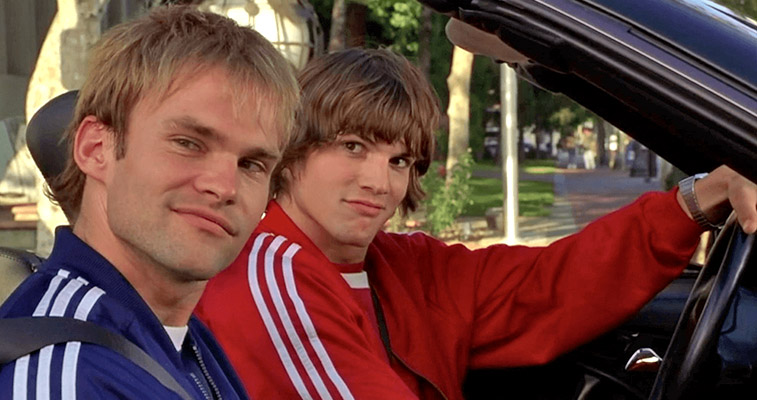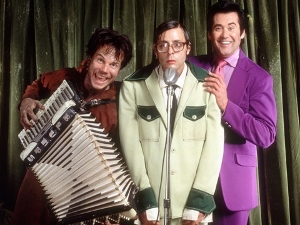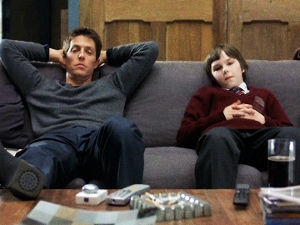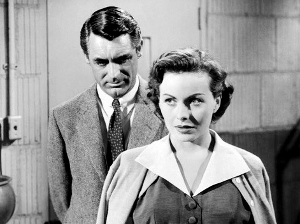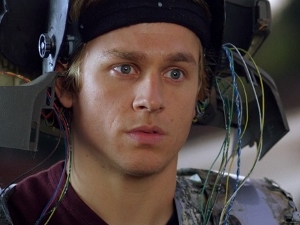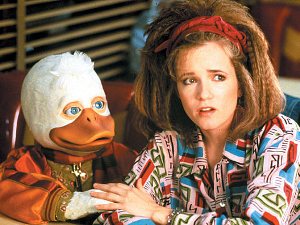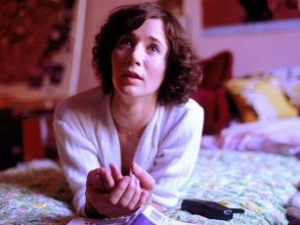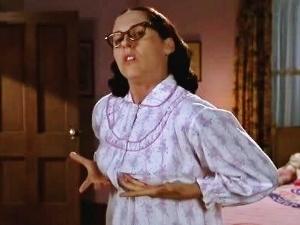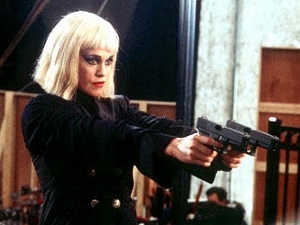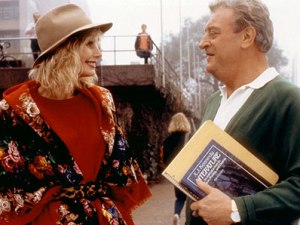The Dark Backward (1991)
[3]
In a dystopian world full of garbage and stained walls, an unfunny comedian (Judd Nelson) starts growing a third arm out of his back. His super-annoying friend (Bill Paxton at his worst) sees the aberration as his ticket out of hell and exploits it for all its worth. A smarmy talent agent (Wayne Newton) decides to rep them, and an even bigger agent (Rob Lowe) decides to bring them to Hollywood. But then the arm disappears and the poor unfunny comedian learns who his true friends are. Spoiler alert: he hasn’t any.
About a Boy (2002)
[7]
An aimless playboy and a dorky middle-schooler become friends through serendipity in About a Boy, based on the book by Nick Hornby and directed by Chris and Paul Weitz of American Pie fame. Hugh Grant plays the playboy, coasting on royalties from a famous song his father wrote. Nicholas Hoult, who would later grow up to later star in X-Men: First Class and Warm Bodies, plays the kid. I have a soft spot for surrogate father/son relationships in movies (and I don’t think I’m alone), but Grant and Hoult do a commendable job playing the parts believably and steering clear of cheese. The film manages to incorporate some real drama into the mix, especially regarding Hoult’s suicidal mother (Toni Collette), without getting too weighed down.
People Will Talk (1951)
Frankie Go Boom! (2012)
[6]
Charlie Hunnam (Sons of Anarchy, Pacific Rim) stars as Frankie, a hapless fellow who is constantly humiliated on camera by his older brother, Bruce (Chris O’Dowd). After one of Bruce’s videos became an internet sensation, Frankie went into isolation. But now that Bruce is getting out of rehab, their mother (Nora Dunn) convinces Frankie to give his brother a second chance. Unfortunately, Bruce is still up to his old tricks and a new, even more volatile video has hit the web. Can the brothers work together to stop the video from going viral before multiple lives are ruined?
Howard the Duck (1986)
[6]
This may be a guilty pleasure, but I also think it inherited an unfair reputation, too. George Lucas wanted to produce a comic film noir. No matter how well it was done, it would never be a huge hit. His name proved cancerous to the movie, unintentionally promising universal appeal for what is really a niche movie. The critics took their best shots and Howard the Duck went down as one of the most famous flops in movie history.
Me and You and Everyone We Know (2005)
[7]
Writer/director Miranda July also stars in this Cannes and Sundance Film Festival winner about people trying to connect with each other in an age when culture and technology make that connection more challenging. The film seems to be saying that we are all experiencing this difficulty, but July’s characters are so quirky and awkward that Me and You and Everyone We Know is as much an absurdist fairy tale as it is social commentary. Either way, it’s an interesting film full of bizarre relationships mined for greater truth than for exploitation. Take a six-year old boy’s on-line relationship with a mysterious woman who agrees to “poop back and forth” into each other forever. Or a grown man’s sexually explicit window signage for two teenaged girls that pass by his apartment every day. July doesn’t play these up for laughs, but instead takes them to realistic and surprising conclusions. When the teenaged girls become curious and knock on the man’s door, he hides in fear. And when the boy agrees to meet his sexting partner, the potential nightmare is revealed to be something sweet and tender.
Superstar (1999)
Cecil B. DeMented (2000)
[6]
In this opus from writer/director John Waters, Stephen Dorff (Blade, The Gate) plays the title character, a cult movie director who gathers a flock of teen drug addicts and whores to join him in a literal war against mainstream film making. Their efforts attract media attention when they kidnap a Hollywood star (Melanie Griffith) and force her to be in their underground flick. I can certainly appreciate the desire to obliterate an industry that markets drivel to the masses, but I’d have preferred a little more meat on these bones. Griffith’s character in particular is hard to get a handle on, her transformation from bitchy diva to Demented acolyte fitting too conveniently into the needs of the plotting. And I’d like for Waters to have pushed Dorff further over the edge as well. Everyone is a neat stereotype and things are played strictly for laughs. But, hey – that’s the Waters way.
Back to School (1986)
[7]
Rodney Dangerfield stars as a corporate tycoon who enrolls in college to help inspire his son (Christine‘s Keith Gordon) to stay in school. Now, I’m hard on comedies and I honestly don’t like very many of them — but I really enjoyed Back to School. It’s a terrific vehicle for Dangerfield and his direct, throw-away sensibility. When a stand-up comic is featured in a narrative film, the formulaic plot usually ends up constraining the talent and strangling all the fun out of the movie. But Back to School keeps things loose enough for Dangerfield to shine. It even allows him to keep his balls after the obligatory third-act character catharsis. (Learning lessons can be so castrating.)

